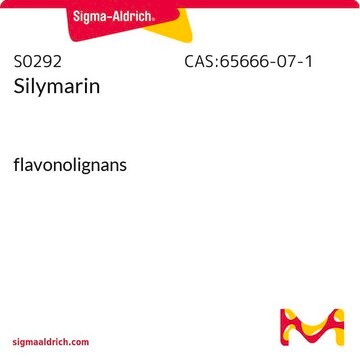239802
Curcumin, Curcuma longa L.
A cell-permeable and irreversible antitumor and anti-inflammatory agent that acts as an inhibitor of 5-lipoxygenase (IC₅₀ = 8 µM) and cyclooxygenase (IC₅₀ = 52 µM).
Synonym(s):
Curcumin, Curcuma longa L., 1,7-Bis(4-hydroxy-3-methoxyphenyl)-1,6-heptadiene-3,5-dione, NOD2 Signaling Inhibitor I, Nucleotide-binding Oligomerization Domain 2 Signaling Inhibitor I, Histone Acetyltransferase Inhibitor I, HAT Inhibitor I, p300/CBP Inhibitor I
About This Item
Recommended Products
Quality Level
Assay
≥80% (HPLC)
form
solid
manufacturer/tradename
Calbiochem®
storage condition
OK to freeze
protect from light
color
orange-yellow
solubility
acetic acid: 10 mg/mL
DMSO: 5 mg/mL
shipped in
ambient
storage temp.
10-30°C
InChI
1S/C21H20O6/c1-26-20-11-14(5-9-18(20)24)3-7-16(22)13-17(23)8-4-15-6-10-19(25)21(12-15)27-2/h3-13,22,24-25H,1-2H3/b7-3+,8-4+,16-13-
InChI key
ZIUSSTSXXLLKKK-KOBPDPAPSA-N
General description
IC50 of ~25 µM. Does not affect p300/CREB binding protein-associated factor (PCAF).
Biochem/physiol Actions
5-lipoxygenase
Warning
Reconstitution
Other Notes
Cui, L., et al. 2007. Antimicrob. Agents Chemother.51, 488.
Salvioli, S., et al. 2007. eCAM4, 181.
Balasubramanyam, K. et al. 2004. J. Biol. Chem.279, 51163.
Brouet, I., and Okshima, H. 1995. Biochem. Biophys. Res. Commun. 206, 533.
Korutla, L., and Kumar, R. 1994. Biochim. Biophys. Acta1224, 597.
Flynn, D.L., et al. 1986. Prostagland. Leuk. Med. 22, 357.
Legal Information
Storage Class Code
11 - Combustible Solids
WGK
WGK 3
Flash Point(F)
Not applicable
Flash Point(C)
Not applicable
Certificates of Analysis (COA)
Search for Certificates of Analysis (COA) by entering the products Lot/Batch Number. Lot and Batch Numbers can be found on a product’s label following the words ‘Lot’ or ‘Batch’.
Already Own This Product?
Find documentation for the products that you have recently purchased in the Document Library.
Customers Also Viewed
Our team of scientists has experience in all areas of research including Life Science, Material Science, Chemical Synthesis, Chromatography, Analytical and many others.
Contact Technical Service



![[6]-Gingerol ≥98% (HPLC)](/deepweb/assets/sigmaaldrich/product/structures/259/444/6877889c-1cc0-47f5-b807-f847deadec1d/640/6877889c-1cc0-47f5-b807-f847deadec1d.png)








